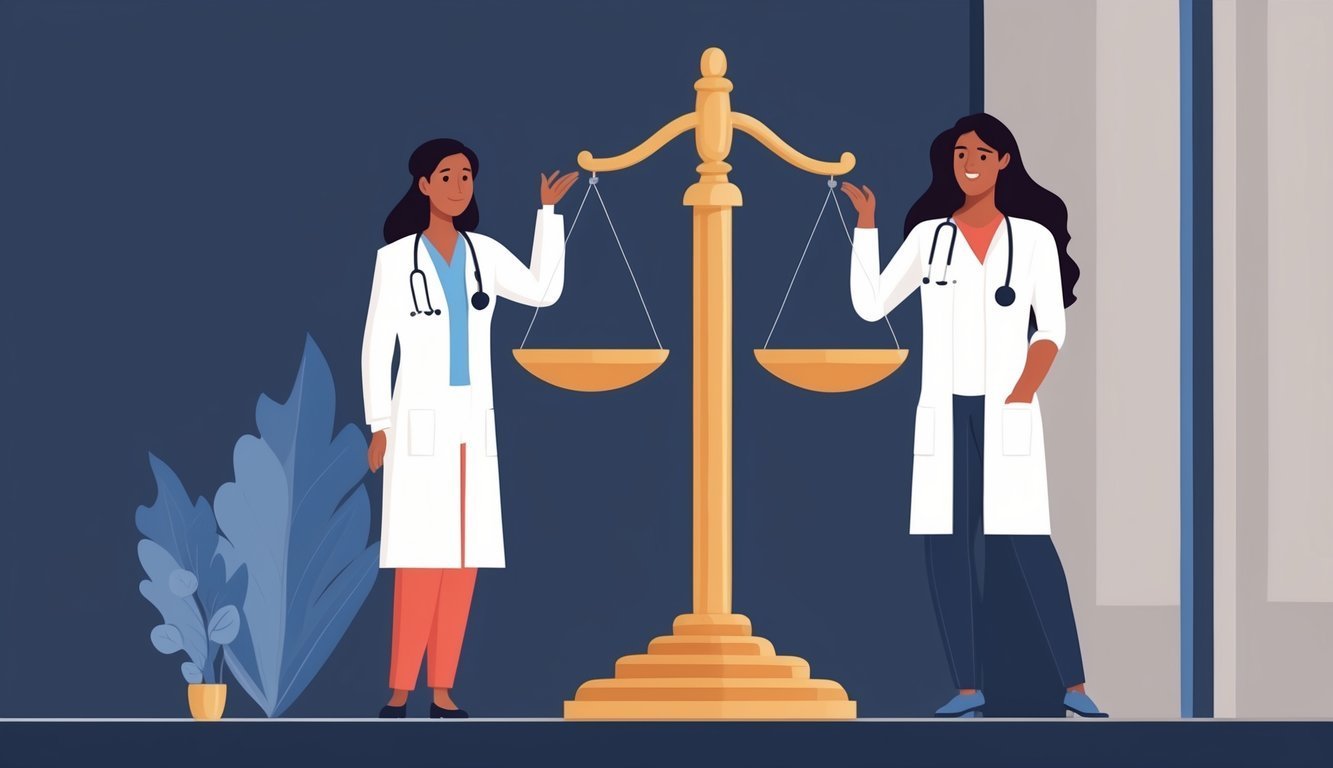When considering a career in nursing, you need to understand the financial differences between a Licensed Practical Nurse (LPN) and a Registered Nurse (RN). RNs have a median annual salary of around $86,070, which is significantly higher than the average LPN salary of approximately $37,150. This disparity reflects not only the education and responsibilities associated with each role but also the various opportunities available in diverse healthcare settings.
As you explore your nursing career options, it’s important to weigh the long-term benefits of becoming an RN against the quicker entry path of becoming an LPN.
While LPNs often focus on basic patient care and have a shorter training period, RNs take on more complex responsibilities, which leads to greater earning potential over time.
The growth projections for these roles also indicate a promising future, with the BLS projecting a 6% increase for RNs and 5% for LPNs through 2032.
By understanding the differences between these two paths, you can make an informed decision that aligns with your goals and aspirations in the nursing field.
Resources like Nurse.org and PracticalNursing.org provide valuable insights on salary comparisons and job outlooks, which can further aid in your decision-making process.
Understanding LPN and RN Roles
The roles of Licensed Practical Nurses (LPNs) and Registered Nurses (RNs) are distinct but interconnected pathways in the nursing profession.
Understanding their differences is essential for anyone considering a career in nursing.
Scope of Practice for LPNs and RNs
Licensed Practical Nurses usually work under the supervision of RNs or physicians.
Their responsibilities include basic patient care, monitoring vital signs, administering medications, and assisting with daily living activities.
They often work in settings like long-term care facilities and outpatient clinics.
On the other hand, Registered Nurses have a broader scope of practice.
In addition to performing many of the same tasks as LPNs, RNs assess patient conditions, devise care plans, and educate patients and their families.
They can also specialize in areas such as pediatrics, oncology, or emergency care.
The differences in scope often lead to higher salaries for RNs.
Educational Paths for LPNs and RNs
The educational requirements differ significantly between LPNs and RNs.
To become an LPN, you typically complete a one-year diploma program focused on practical nursing skills.
This education is followed by passing the NCLEX-PN exam for licensure.
In contrast, RNs must obtain an Associate Degree in Nursing (ADN), which generally takes 18-24 months, or a Bachelor of Science in Nursing (BSN), typically a four-year program.
Following their education, RNs must pass the NCLEX-RN exam to become licensed.
Licensure and Certification
Both LPNs and RNs must be licensed to practice.
After completing their respective educational programs, LPNs take the NCLEX-PN exam, while RNs take the NCLEX-RN exam.
Passing these exams is essential for obtaining licensure.
Continuing education is important for both roles.
LPNs may pursue further certifications to advance their skills.
RNs can specialize in various fields, often enhancing their career opportunities and earning potential.
Certifications in specific areas can also improve job prospects and demonstrate expertise to employers.
Comparative Salary Overview
Understanding the salary differences between Licensed Practical Nurses (LPNs) and Registered Nurses (RNs) is essential when considering a nursing career.
The disparities often stem from education, responsibilities, and regional demand.
Average LPN Salary
As of 2024, the average salary for LPNs is approximately $56,000 per year.
This figure may vary based on factors such as location, experience, and specific healthcare settings.
State-by-state variations can be significant, with highest-paying states like California and Massachusetts often offering higher annual salaries, sometimes exceeding $65,000.
| State | Average LPN Salary |
|---|---|
| California | $67,000 |
| Massachusetts | $65,000 |
| Texas | $54,000 |
| Florida | $48,000 |
Consider the demand in your area, as this can greatly affect your earning potential as an LPN.
RN Salary Prospects
For RNs, the average salary is considerably higher, estimated at around $80,000 annually.
The increased compensation reflects the advanced training and broader responsibilities associated with this role.
Registered Nurses often have more opportunities for specialization, which can lead to increased earnings.
| RN Specialty | Average Salary |
|---|---|
| Nurse Anesthetist | $200,000 |
| Clinical Nurse Specialist | $90,000 |
| Nurse Practitioner | $110,000 |
When comparing LPN and RN salaries, it’s clear you may earn significantly more as an RN, but this requires a commitment to education and training.
Workplace and Specializations
Your work environment and the ability to specialize significantly influence your career as either an LPN or RN.
Different healthcare settings offer varying roles, responsibilities, and opportunities for advancement.
Specializations can lead to better job satisfaction and higher salaries.
Typical Healthcare Facilities
Your workplace as a nurse often depends on your qualifications.
The following are common healthcare settings where LPNs and RNs can practice:
| Healthcare Facility | Typical Roles |
|---|---|
| Hospitals | Patient care, surgical assistance, emergency care |
| Nursing Homes | Daily living assistance, geriatric care |
| Outpatient Care Centers | Routine health check-ups, minor procedures |
| Medical and Surgical Hospitals | Specialized medical care, recovery services |
| Nursing Care Facilities | Long-term patient care, rehabilitation |
LPNs typically work under the supervision of RNs or physicians.
RNs have more autonomy and can take on roles such as nurse practitioners or clinical nurse specialists.
Specialized Nursing Careers
You may choose to specialize in various nursing fields, enhancing your career opportunities.
Some common nursing specialties include:
- Geriatric Nursing: Focus on elderly care in nursing homes or home healthcare.
- Pediatric Nursing: Work with children in hospitals or outpatient clinics.
- Oncology Nursing: Provide care for cancer patients in specialized settings.
- Critical Care Nursing: Manage patients in intensive care units.
Pursuing a specialty often requires additional certifications and education but can result in higher salaries and fulfilling career paths.
Registered Nurses enjoy greater access to these advanced roles, while Licensed Practical Nurses may also find rewarding niche areas.
Career Growth and Opportunities
In the nursing field, career growth varies significantly between Licensed Practical Nurses (LPNs) and Registered Nurses (RNs).
Understanding these pathways can help you make informed decisions about your nursing career.
Advancement from LPN to RN
Many LPNs pursue further education to become RNs.
Transitioning from an LPN to RN typically involves enrolling in an RN program.
These programs can be either:
| Program Type | Duration | Degrees Offered |
|---|---|---|
| ADN (Associate Degree in Nursing) | 2 years | Associate’s Degree |
| BSN (Bachelor of Science in Nursing) | 4 years | Bachelor’s Degree |
Job Outlook
The job outlook for both LPNs and RNs remains positive.
The Bureau of Labor Statistics projects a 6% growth for RNs and a 5% growth for LPNs from 2022 to 2032.
This growth is fueled by a persistent nursing shortage, creating opportunities for both roles.
Continuing Education
Continuing education is critical for career advancement.
You can enhance your skills through:
- Nursing certifications
- Specialized training programs
Pursuing these options can improve your job prospects and earning potential.
Nursing Education Pathways
If you’re considering furthering your education, look into various nursing programs that best suit your career goals.
Options available include:
- LPN programs for entry-level positions
- RN programs for registered nursing roles
By choosing the right educational path, you can position yourself for greater professional success in nursing.
For more information, explore LPN to RN transitions and other resources.
The Daily Responsibilities of LPNs and RNs

As you explore the daily responsibilities of Licensed Practical Nurses (LPNs) and Registered Nurses (RNs), it becomes clear that both roles are vital in providing patient care, though their duties differ significantly.
Understanding these nuances can help clarify the paths within the nursing profession.
LPN Job Duties
LPNs primarily focus on basic patient care under the supervision of RNs or physicians.
Their responsibilities often include:
- Monitoring Vital Signs: LPNs regularly check blood pressure, heart rate, and temperature.
- Medication Administration: They administer medications and monitor for side effects.
- Wound Care: LPNs assist in dressing wounds and managing intravenous lines.
- Patient Education: They provide patients with instructions on post-discharge care and medication usage.
- Assisting with Daily Activities: This includes helping patients with grooming, bathing, and mobility.
LPNs are crucial in nurturing patient safety and comfort, ensuring that you receive appropriate care during recovery.
RN Job Responsibilities
RNs take on more complex patient care tasks and have a broader scope of practice.
Their responsibilities include:
- Developing Nursing Care Plans: RNs assess patient needs and create individualized care plans.
- Conducting Diagnostic Tests: They order and interpret lab tests and imaging as needed.
- Administering Blood Products: RNs are trained to safely manage blood transfusions.
- Supervising LPNs and Aides: They oversee the work of LPNs and nursing assistants.
- Patient Education: RNs provide in-depth education on health conditions, medications, and lifestyle modifications.
The advanced skills of RNs enable them to tackle intricate patient scenarios, elevating your care experience.
For further details, check resources on LPN vs RN responsibilities and daily duties of LPNs and RNs.

